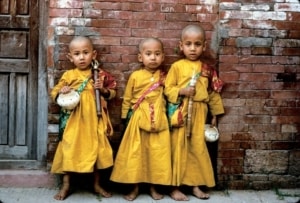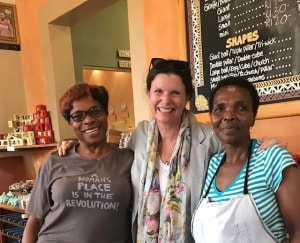Bonnie: I had had a catering business in Manhattan for ten years, and I was ready to hang up my chef’s hat! I was really exhausted and ready for a big change. Perhaps I was even going through a belated mid-life crisis. I wanted to do something more adventurous and purposeful with my life. I wanted to do something useful in a place where age might be seen as an advantage. The Peace Corps offered exactly what I was looking for.
John: I remember when I joined the Peace Corps in my 50s I was concerned that I might not be accepted by the younger volunteers. Was that one of your concerns?
Bonnie: Actually, it wasn’t. Even though I was old enough to be almost everyone’s mother, I didn’t feel that they treated me any differently. They liked to stop by my house in Lastoursville (which was on the train line) as though it was a country inn run by a friend. They knew they could count on homemade bread and soup – and clean, dry sheets on the spare bed. They nicknamed me “the Martha Stewart of Gabon,” which was both funny and fitting. I’m still in touch with many of them, even after nearly 15 years.
John: Your Peace Corps service in Africa was not your first experience of the continent. Is there a particular message you would like to convey about Africa and developing countries in general?
Bonnie: Yes, I lived in Zimbabwe – what was then Rhodesia – when I was in my mid-20s, and I fell in love with Africa then. So another reason I joined the Peace Corps was to be able to return to Africa, after having felt homesick for it for so long. I believe we all originated in Africa, and Africa has a lot to teach us. I’d like the readers of How to Cook a Crocodile to see a positive side to Africa that Americans seldom see in the media – the human connectedness, the emphasis on family, the importance of kindness and generosity. I’m hoping that readers of my book will see Africa and Africans in a fresh, new, positive light.
John: Readers of your book will note that you suffered a severe burn accident and a harrowing time near the mid-point of your Peace Corps service. Most people would have given up, ended their service and returned home – with good reason. Why did you stay and continue your service?
Bonnie: I had many reasons to stay, the main one being that I loved my work in Lastoursville – teaching health and nutrition, mostly to women’s groups and elementary school children – and I didn’t want it to end. Also, what did I have in New York to return to? I’d closed my business and sublet my apartment. I wouldn’t have had a job or a place to live. The Peace Corps offered to send me home to have skin grafting, but the burn was on my upper thigh. I thought, “I’m in my 50s; I’m not going to be modeling bathing suits.” I’m very glad I stayed.
John: When you were serving in Gabon, did you keep a journal? If so, how did you set aside the time to record your thoughts?
Bonnie: Oh, yes, I kept a journal and wrote in it every morning at dawn, as I watched the sun come up over the mountains in the distance and listened to the birds sing in the palm tree outside of my window. I think it’s important for writers to write every day, preferably in the morning, soon after waking. I relied on my journal entries when writing this book because my memory for details is not all that reliable.
John: In a review of your book for the Peace Corps Worldwide website, the well known writer and former Peace Corps volunteer Thurston Clarke said you “have succeeded in writing a guide to living with grace and gusto, wherever you are, and whatever you happen to be doing.” What would you like your readers and prospective volunteers to take away from your book?
Bonnie: First, I am very grateful for Thurston’s review, and I was deeply touched by it. What I’d love is for other readers to feel similarly: That they might feel inspired or encouraged by my book to go out and fulfill their own dreams of doing something purposeful in the world.
John: Do you have plans for another book?
Bonnie: Yes, in fact, I have the sequel to this book already written. Crocodile ends with the end of my two-year Peace Corps service in Gabon. The next book is about what follows – the economic development project I created in Segou, Mali, West Africa, teaching patchwork quilting to Malian seamstresses. This Mali book, titled Patchwork: A Memoir of Mali, has yet to be published. I’m keeping my fingers crossed!
John: Thank you, Bonnie.




